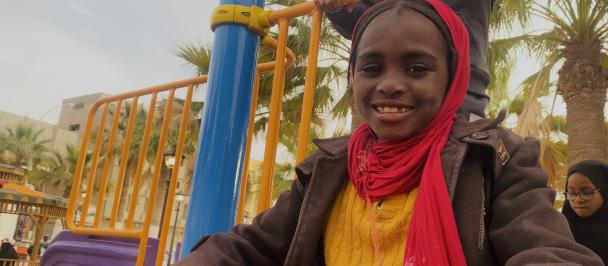Dr Bouthina Ali Elfaitouri is talking to a patient during a medical consultation at the Emergency Department of the Sabratha Teaching Hospital. Photo : ©UNDP Libya/ Abdullah Hussin
Dr Bouthina Ali Elfaitouri is a surgery doctor at the Sabratha Teaching Hospital (STH). She has been working in the Emergency Department for five years. She knows from experience how important it is to have effective medical services and how they can be crucial in saving lives. She was afflicted when she was not able to provide required services because of the challenging working conditions she was facing.
During the war that the city experienced in 2017, the medical facility was severly damaged, including the Emergency Department. Access to quality services became very difficult for many patients. In order to keep services delivery, the hospital opened a temporary Emergency Department, but this center was only able to provide half of the services.
''We went through bad times when we did not have anything in the Department and we were asking patients to bring gloves, medical bundles, injections and whatever might be needed in case an operation was necessary,'' said Dr Bouthina. '' I was an eyewitness for many car accident victims who lost their lives because of the lack of equipment and materials, which ought to be in the Emergency Department,'' she added.
''The main reason for the decrease of quality medical services in the hospital is the damage caused to the building during violent clashes in 2017 as well as the shortage of equipment, materials and nursing staff,'' declared Hadhom Krair, Head of the Nursing Department.
The temporary Emergency Department did not only lacked basic equipments but was also too small to receive all the incoming patients. This impacted negatively on the quality of services provided.
STH was established in 1983. With 360 beds, it employs a total of 1,406 staff among whom specialist doctors, medical doctors, nurses and general services staff. The institution has 14 departments working seven days a week and 24 hours a day.
One of the damaged rooms at the Emergency Department before and after renovation. Photo : ©UNDP Libya/ Abdullah Hussin
Basic services needed for the well-being of the people
A doctor is checking the oxygen session supply to a patient who suffers from a breathing problem at the Emergency Department, Sabratha Teaching Hospital. Photo : ©UNDP Libya/ Abdullah Hussin
Aimed at supporting access to basic services, community security and economic recovery in Libya, the European Union funded Strengthening Local Capacities for Resilience and Recovery project is being implemented in coordination with the Ministry of Local Governance and Tripoli, Sabratha, Sebha, Murzuq, Benghazi and AlKufra municipalities. It is supporting local peace actions and promoting dialogue across different communities, while currently working on 33 initiatives to rehabilitate critical infrastructures and supply equipment.
The Resilience project has completed four projects in Sabratha, including the renovation of the High Institute for Science and Techology, the Health Center, the Emergency Department of STH, the basketball court and the public tennis courts.
Dr. Bouthina writes a prescription for a patient at Sabratha Teaching Hospital . Photo credit: ©UNDP Libya/ Abdullah Hussin
Renovating the Emergency Department, revitalizing the heart of STH.
During 2017, the hospital provided its services to more than 16,000 patients from Sabratha and neighbouring cities. 60% of the patients used to come from outside of Sabratha. The Emergency Department plays a key role in the medical institution as it is the one which receives the greatest number of patients per day.
''The Emergency Department receives more patients than other units at this hospital. Around 450 patients were coming daily to the hospital for an emergency. It was good that UNDP and the EU renovated this department. It came at the right time,” said Dr. Fathei Omar Elkwash, the manager of Sabratha Teaching Hospital. ''Now,we are receiving 500 people per day'', he added.
The Emergency Department is of paramount importance not only for people in Sabratha but also for patients coming from other cities from Zawiya to Ras Jedir. As a matter of fact, some medical institutions in the area closed their doors because of the crisis. Therefore, many people in the region have been relying on this unit for emergency services. This resulted in a great number of patients received daily.
Better working conditions motivate medical staff
The newly renovated Emergency Department is now receiving patients in better conditions. It obtained four obstetric beds and some furniture. The medical staff is proud to work in this improved environment.
''We are very happy with the renovation. The facility is able to receive a great number of patients as it has a great capacity,'' declared Mr Ahmed Mohammed Kornaf, Head of the Emergency Department. ''Now we have two big observation rooms, one for women and one for men in addition to the main whole which has six bed and the relevant equipment,'' he added.
''I remember when we were using corridors to receive a great number of victims of an accident for example. At that time, we were closing all other departments and calling all doctors and nursing staff to support us,'' he went on saying.
The Emergency Department provides several services including surgical ambulance, internal medicine and post anesthesia care unit.
Mr. Abdulrahman Rhoma suffers from a chronic heart disease. ''The Emergency Department has a big space to receive a great number of ill people, '' he stated. ''It provides with all services a patient may need,'' he added.
Mr Abdulrahman Rhoma is undergoing a medical check at the Emergency Department. Photo : ©UNDP Libya/ Abdullah Hussin

 Locations
Locations






